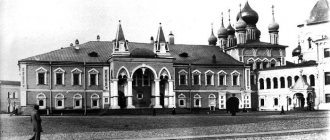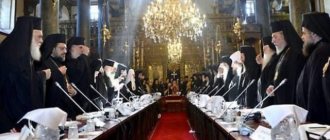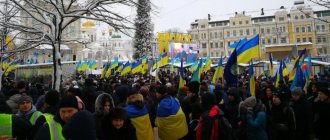The Russian Church knows three degrees of priesthood: deacons, presbyters (priests, priests) and bishops (bishops). Orthodox clergy are divided into white clergy (married priests) and black clergy (monks). This article will talk about the hierarchs of the Orthodox Church, representatives of the third, highest degree of priesthood.
Who is a bishop in the Orthodox tradition
This is a synonymous concept, used as often and in the same meaning as “hierarch”, “archpastor”. He is a dignitary of the Orthodox Church. A clergyman of this rank performs all the sacraments and leads the life of the church community.
In accordance with Christian doctrine, the archpastor, through the sacrament of ordination, receives apostolic grace received from Jesus Christ. In the Russian Orthodox tradition, representatives of the monastic clergy reach such heights of hierarchical levels, since it is obligatory for them to observe the vow of celibacy.
Origin of the word
The word “bishop” comes from the ancient Greek “high priest, high priest” (“archi” - beginning, superior; “priest” - priest).
Meaning of the concept
Archpastoral service is akin to schema tonsure and involves complete renunciation of one’s own will. All hierarchs (with the exception of vicars) govern the dioceses. In ancient times they were divided into bishops, archbishops and metropolitans according to administrative powers. In the modern church these titles are retained as honorary titles. From among them, a patriarch is elected, who leads the Local Church until the end of his life.
The Church, in accordance with Christian doctrine, must endure until the end of time. Therefore, the power Jesus gave to the Apostles did not have to end with their death, it remained part of the church forever. The apostles transferred their powers to persons who received the name bishops (guardians). The highest supervision and management in Christian communities passed to them. In capitals they are called metropolitans (from the Greek “metropolis” - capital).
All archpastors are equal to each other, but the oldest of them bear the title of archbishop and enjoy special respect from those around them.
Officially accepted request:
- to bishops - “Your Eminence”;
- to an archbishop or metropolitan - “Your Eminence”;
- to the patriarch - “Your Holiness”, informally you can address “Vladyka”.
Patriarchate of Patriarch Pimen
1972 consecrations
- Chrysostom (Martishkin), Metropolitan, former Vilna and Lithuania (April 23, 1972; retired since December 24, 2010)
- Anatoly (Kuznetsov), Archbishop, former Kerch, vicar of the Sourozh diocese (September 3, 1972; retired since May 4, 2017)
1973 consecrations
- Platon (Udovenko), Metropolitan of Feodosia and Kerch (December 16, 1973; at the department since December 20, 2012)
1975 consecrations
- Iriney (Middle), Metropolitan of Dnepropetrovsk and Pavlograd (July 27, 1975; at the department from October 19, 1993)
- Agafangel (Savvin), Metropolitan of Odessa and Izmail (November 16, 1975; at the see since June 20, 1992)
1976 consecrations
- Kirill (Gundyaev), Patriarch of Moscow and All Rus' (March 14, 1976; elected to the patriarchal throne on January 27, 2009, enthroned on February 1, 2009)
- Valentin (Mishchuk), Metropolitan, former of Orenburg and Saraktash (July 25, 1976; retired since October 22, 2015)
1979 consecrations
- Ilian (Vostryakov), bishop, former Serpukhov, vicar of the Moscow diocese (November 25, 1979; retired since February 17, 1997)
1980 consecrations
- Lazar (Shvets), Metropolitan of Simferopol and Crimea (April 18, 1980; at the see since July 27, 1992)
- Methodius (Nemtsov), Metropolitan of Perm and Kungur (April 27, 1980; at the see since March 5, 2010)
- Mark (Arndt), Metropolitan of Berlin and Germany (ROCOR) (November 30, 1980[1]; on the see from September 28, 1982)
1982 consecrations
- Clement (Kapalin), Metropolitan of Kaluga and Borovsk (August 8, 1982; at the see since July 20, 1990)
1983 consecrations
- Sergius (Fomin), Metropolitan of Voronezh and Liskinsky (January 30, 1983; at the see since May 7, 2003)
1984 consecrations
- Eusebius (Savvin), Metropolitan, formerly of Pskov and Porkhov (April 1, 1984; retired since May 14, 2021)
- Hilarion (Capral), Metropolitan of Eastern America and New York, First Hierarch of the ROCOR (December 10, 1984[1]; on the cathedra since May 18, 2008)
1985 consecrations
- Vladimir (Ikim), Metropolitan of Omsk and Tauride (June 30, 1985; at the see since July 27, 2011)
- Anthony (Moskalenko), Archbishop of the Urals and Aktobe (October 13, 1985; at the see since January 30, 1991)
1987 consecrations
- Simon (Ishunin), Archbishop of Brussels and Belgium (April 11, 1987; on the see from the day of consecration)
- Panteleimon (Dolganov), Metropolitan, former Yaroslavl and Rostov (May 17, 1987; retired since December 26, 2021)
- Lev (Tserpitsky), Metropolitan of Novgorod and Staraya Rus' (November 1, 1987; at the see since July 20, 1990)
1988 consecrations
- Mark (Petrovtsy), Metropolitan of Khust and Vinogradov (July 28, 1988; at the see since December 14, 2007)
- Nikandr (Kovalenko), bishop, former Zvenigorod, vicar of the Moscow diocese (August 7, 1988; retired since February 17, 1997)
- Alexy (Kutepov), Metropolitan of Tula and Efremov (December 1, 1988; at the department since October 7, 2002)
- Victor (Oleynik), Metropolitan, former Tver and Kashinsky (December 4, 1988; retired since July 14, 2021)
- Anastasy (Metkin), Metropolitan, former Simbirsk and Novospassky (December 11, 1988; retired since August 30, 2019)
1989 consecrations
- Anthony (Cheremisov), Metropolitan, former Oryol and Bolkhov (April 22, 1989; retired since February 26, 2021)
- Jonathan (Eletskikh), Metropolitan of Tulchin and Bratslav (April 23, 1989; at the see since November 22, 2006)
- Sergius (Poletkin), Metropolitan of Samara and Novokuibyshevsk (May 5, 1989; at the department since February 23, 1993)
- Vladimir (Kantarian), Metropolitan of Chisinau and All Moldova (July 21, 1989; at the department from the day of consecration)
- Alexander (Kudryashov), Metropolitan of Riga and All Latvia (July 23, 1989; at the department from October 27, 1990)
- Dimitry (Drozdov), Archbishop of Vitebsk and Orsha (July 23, 1989; at the see from July 7, 1992)
- Alexander (Mogilev), Metropolitan of Astana and Kazakhstan (September 27, 1989; at the department since March 5, 2010)
- Arseny (Epifanov), Metropolitan of Lipetsk and Zadonsk (October 5, 1989; at the see since July 9, 2021)
1990 consecrations
- Vadim (Lazebny), Metropolitan of Yaroslavl and Rostov (February 4, 1990; at the department since December 26, 2021)
- Bartholomew (Vashchuk), Metropolitan of Rivne and Ostrog (February 24, 1990; at the see since July 27, 1995)
- Stefan (Korzun), Archbishop of Pinsk and Luninets (March 4, 1990; on the see from the day of consecration)
- Filaret (Karagodin), archbishop, former of Penza and Kuznetsk (March 11, 1990; retired from May 31, 2010)
- Victor (Pyankov), bishop, former Podolsk, vicar of the Moscow diocese (March 25, 1990; retired from July 19, 1999)
Features of the ministry
The Bishop, being in the liturgical assembly, plays the same role that Christ played in the company of his disciples. That is why, in most cases, he must preside over every divine service in his diocese. The performance of services by other clergy is carried out only with the will of the main clergy.
According to the ancient Byzantine tradition, the sign allowing a clergyman to conduct services is the antimins issued to him by the bishop (a cloth made of linen or silk into which parts of the relics of some saint are sewn).
Saint Simeon of Thessalonica, who lived at the end of the 14th century, said the following about such service:
“No priest can officiate... unless he has been ordained, and ordination is from the Master; therefore, the bishop’s grace acts through him (the priest). Further, the priest does not perform the sacraments without the altar, the altar is consecrated by the chrism, and the chrism is consecrated by the bishop alone... Also: no one baptizes unless he has been ordained... And also cannot baptize without the chrism..., therefore, the bishop performs all the divine sacraments... And without it there will be no throne, no ordination, no holy chrism, no Baptism, and therefore no Christians.”
Each priest has the right to celebrate the Eucharist (communion) and other services in his parish, but he still does not have the fullness of the gift of the Apostles, which descends on the bishop. Even the order of the liturgy and partly other church services can be greatly modified if the service is led by a clergyman of this level or even simply present in the church.
Ordination
Each bishop is given the rank by another bishop - this makes it possible to maintain a continuous connection through the centuries between generations of the priesthood. The candidate is elected and approved by the Patriarch and the Holy Synod.
The ordination procedure itself is usually performed by a council of bishops, headed by the patriarch. The Russian Orthodox Church elects bishops from among the monks of the minor schema, and in the Catholic Church these can be widowers - priests or celibates.
Patriarchate of Patriarch Alexy II
1990 consecrations
- Tikhon (Emelyanov), Metropolitan of Vladimir and Suzdal (August 19, 1990; at the see since December 28, 2021)
- Nikon (Vasyukov), Metropolitan of Ufa and Sterlitamak (August 26, 1990; at the department from the day of his consecration)
- Vincent (Morar), Metropolitan of Tashkent and Uzbekistan (September 2, 1990; at the see since July 27, 2011)
- Dimitry (Kapalin), Metropolitan of Tobolsk and Tyumen (November 4, 1990; at the department from the day of his consecration)
- Vasily (Zlatolinsky), archbishop, former Zaporozhye and Melitopol (December 2, 1990; retired from April 14, 2009)
- Onufry (Berezovsky), Metropolitan of Kiev and All Ukraine (December 9, 1990; at the department since August 17, 2014)
Role in the church
The arrival of the archpastor and a service with his participation is always a great event for the parishioners. There may be dozens or hundreds of temples under his leadership, and it is not always possible to visit each of them at least once. Therefore, the life path of the diocesan Bishop very often takes place on the road. After all, there are services that only he has the right to perform.
These include:
- ordination (consecration) to the rank of bishop, presbyter, deacon;
- ordination to the rank (consecration) of subdeacon, archdeacon, protodeacon, etc.;
- awarding church awards;
- consecration of the temple, antimension, world.
We must not forget about the dual nature of such power. On the one hand, the Church, the body of Christ, unites with Christians through the celebration of the church sacrament of the Eucharist. The bishop is the central person in the sacrament being performed. In ancient times, only he could give communion to parishioners, but over time and the number of communities grew, he began to delegate these powers to priests.
This is the mystical role of the Lord in the Christian community. But, in addition, there is the church as a community of people who live here and now. And the second important responsibility of the bishop is to properly lead this community.
A clergyman of this rank bears great responsibility on his shoulders, since he is responsible for the souls of his parishioners and their spiritual life. His task is seen to be that, bearing such a high title and receiving honors, he remains a person who is able to perceive the pain of other people, their needs and aspirations, remember their weaknesses and infirmities and have an inner need to help them.
Patriarchate of Patriarch Alexy I
1962 consecrations
- Vladimir (Kotlyarov), Metropolitan, formerly of St. Petersburg and Ladoga (December 30, 1962; retired since March 19, 2014)
1965 consecrations
- Yuvenaly (Poyarkov), metropolitan, former Krutitsky and Kolomna (December 26, 1965; retired from April 15, 2021)
1968 consecrations
- German (Timofeev), Metropolitan, former Volgograd and Kamyshin (December 6, 1968; retired since December 28, 2018)







